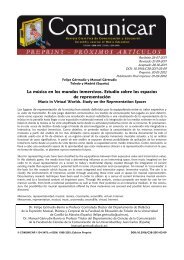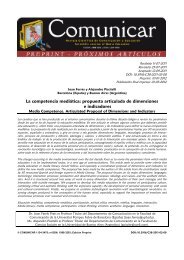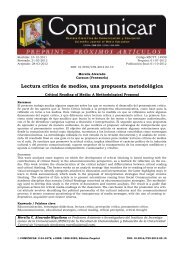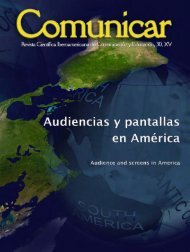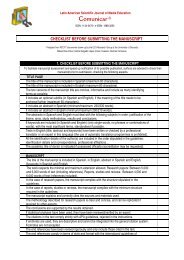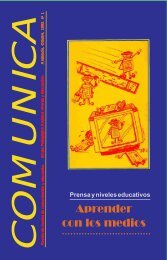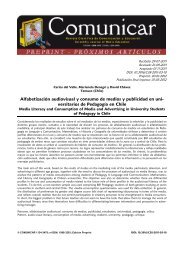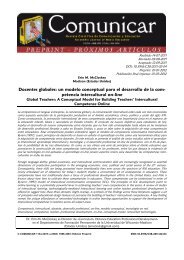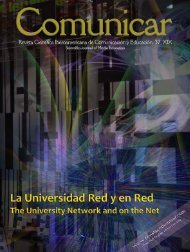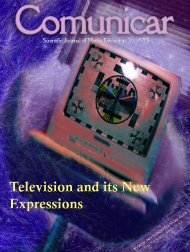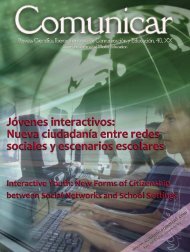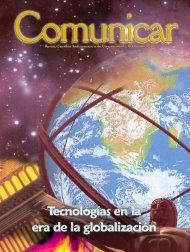72<strong>Comunicar</strong>, 35, XVIII, 2010(www.cyberbullying.us/Cyberbullying_Identification_Prevention_Response_Fact_Sheet.pdf) (12-1-2012)KIERKEGAARD, S. (2008). Cybering, Online Grooming and Ageplay.Computer Law & Security Review, 24(1), 41-55. (DOI: 10. 10 16/ -j.clsr.2007.11.004).LAW, D.M., SHAPKA, J.D., HYMEL, S., OLSON, B.F. & WATER -HOUSE, T. (2012). The Changing Face of Bullying: An EmpiricalComparison between Traditional and Internet Bullying and Victi -mization. Computers in Human Behavior, 28(1), 226-232. (DOI:10.1016/j.chb.2011.09.004).LÉVY, P. (1997). Collective Intelligence: Makind’s Emerging Wordlin Cyberspace. Plenum Trade: New York, USA.LIVINGSTONE, S., HADDON, L., GÖRZIG, A. & ÓLAFSSON, K. (2011).Risks and Safety on the Internet: The Perspective of EuropeanChildren. Full findings. LSE, London: EU Kids Online.LIVINGSTONE, S. & HELSPER, E. (2010). Balancing Opportunitiesand Risks in Teenagers’ Use of the Internet: The Role of OnlineSkills and Internet Self-efficacy. New Media & Society, 12(2),309-329. (DOI: 10.1177/1461444809342697).LOBE, B., LIVINGSTONE, S., ÓLAFSSON, K. & VODEB, H. (2011).Cross-national Comparison of Risks and Safety on the Internet.Initial Analysis from the EU Kids Online Survey of EuropeanChildren. London: EU Kids Online, LSE.MCALINDEN, A. (2006). Setting ‘em up: Personal, Familial and Ins -titutional Grooming in the Sexual Abuse of Children. Social & LegalStudies, 15(3), 3<strong>39</strong>-362. (DOI: 10.1177/096466<strong>39</strong>0 60 66 613).OLIVER, E., SOLER, M. & FLECHA, R. (2009). Opening schools to all(women): Efforts to Overcome Gender Violence in Spain. BritishJournal of Sociology of Education, 30(2), 207-218. (DOI: 10.10 -80/ 01425690802700313).PÉREZ-TORNERO, J. & VARIS, T. (2010). Media Literacy and NewHumanism. Moscow: UNESCO. Institute for Information Tech -nologies in Education.RYAN, T., KARIUKI, M. & YILMAZ, H. (2011). A Comparative Ana -lysis of Cyberbullying Perceptions of Preservice Educators: Canadaand Turkey. Turkish Online Journal of Educational Tech nology,10(3), 1-12.DIRECTIVE OF THE EUROPEAN PARLIAMENT AND OF THE COUNCIL(2002). Combating the Sexual Abuse and Sexual Exploitation ofChildren and Child Pornography, and Replacing Council Frame -work Decision 2004/68/JHA (2011).UNICEF INNOCENTI RESEARCH CENTRE (Ed.) (2011). Child Sa -fety Online. Global Challenges and Strategies. Florence: UNI-CEF.VALLS, R., PUIGVERT, L. & DUQUE, E. (2008). Gender Violenceamong Teenagers - Socialization and Prevention. Violence AgainstWomen, 14(7), 759-785. (DOI: 10.1177/1077801208320365).WILSON, C., GRIZZLE, A., TUAZON, R., AKYEMPONG, K. & CHE -UNG, C.K. (2011). Media and Information Literacy Curri culum forTeachers. Paris: UNESCO.WOLAK, J., FINKELHOR, D., MITCHELL, K.J. & YBARRA, M.L.(2008). Online ‘Predators’ and their Victims: Myths, Realities, andImplications for Prevention and Treatment. American Psychologist,63(2), 111.© ISSN: 1134-3478 • e-ISSN: 1988-3293 • Pages 65-72
D O S S I E Rl Sherri H. Culver & Thomas JacobsonPhiladelphia, Pennsylvania (USA)Received: 16-02-2012 / Reviewed: 25-03-2012Accepted: 28-03-2012 / Published: 01-10-2012DOI: 10.<strong>39</strong>16/C<strong>39</strong>-2012-02-07Media Literacy and Its Use as a Methodto Encourage Civic EngagementAlfabetización mediática como método para fomentar la participación cívicaABSTRACTChanges in technology have opened up a new kind of participatory citizenry; one in which engaged citizens’ blog,post, tweet, upload, create, and otherwise interact with others online. This paper explores the intersection of mediaand information literacy with civic participation by examining three specific programs operating in the United States.These projects include «Powerful Voices for Kids», «The Salzburg Academy on Media and Social Change»; and«Cultivating the NetGeneration of Youth as Global Citizens and Media Literate Leaders in a Digital Age», in whicheducators and students at schools in the USA and Africa meet virtually and physically to explore collaborative methodsthat use media to build bridges of understanding. Through analysis of each program’s practices and personalinterviews with the program director, consistent methods for developing a strong media and information literacy programwith a focus on democratic participation are revealed. These include a need for programs to reflect a respectfor student interest in popular culture, willingness for program educators to put aside assumptions that students lackan interest in current events, recognition that technology use is a means to an end, not the ultimate goal, and the utilizationof a support team for the instructors or educators.RESUMENLos cambios en la tecnología han posibilitado un nuevo tipo de ciudadanía participativa; los ciudadanos utilizanblogs, correos, tweets, principalmente para crear e interactuar con otros. Este artículo explora la intersección de losmedios de comunicación y la alfabetización mediática y su relación con la participación ciudadana, mediante el análisisde tres programas específicos que se llevan a cabo en Estados Unidos. Estos proyectos son «Voces para losniños» (Powerful Voices for Kids), «Academia de Salzburgo en Comunicación y Cambio Social» (The SalzburgAcademy on Media and Social Change) y «Educando a jóvenes en Red como ciudadanos globales, alfabetizadosmediáticamente en la era digital» (Cultivating the NetGeneration of Youth as Global Citizens and Media LiterateLeaders in a Digital Age). En ellos educadores y alumnos de escuelas de Estados Unidos y África tienen encuentrosvirtuales y presenciales para explorar métodos colaborativos, utilizando los medios para construir puentes de entendimiento.A través del análisis de cada programa y las entrevistas personales con algunos de sus directores, se presentanmétodos que consiguen un buen desarrollo de proyectos de alfabetización mediática focalizados en la participacióndemocrática, incluyendo, a su vez, la necesidad de crear actividades que reflejen el respeto hacia el interésde los estudiantes en la cultura popular, la voluntad de los educadores para superar los prejuicios sobre su falta deinterés en temas de actualidad, el reconocimiento de la tecnología como un medio y no como un fin en sí misma, yla utilización de un equipo de apoyo para el profesorado.KEYWORDS / PALABRAS CLAVEMedia literacy, information literacy, democracy, participation, civic engagement, social change, youth media.Alfabetización mediática, alfabetización informacional, participación, democracia, compromiso cívico, cambio social,medios de comunicación juveniles.v Sherri Hope Culver is Assistant Professor in the School of Communications and the Department of Broadcasting,Telecommunications and Mass Media at the Temple University in Pennsylvania (USA) (shculver@temple.edu).v Dr. Thomas Jacobson is Interim Dean in the School of Communications and Theater at the Temple University inPennsylvania (USA) (tlj@temple.edu).<strong>Comunicar</strong>, n. <strong>39</strong>, v. XX, 2012, Scientific Journal of Media Education; ISSN: 1134-3478; pages 73-80www.comunicarjournal.com
- Page 2 and 3:
© COMUNICAR, 39; XXLATIN AMERICAN
- Page 4 and 5:
4Comunicar, 39, XX, 2012C O N T E N
- Page 6 and 7:
6Comunicar, 39, XX, 2012Submission
- Page 8 and 9:
8Comunicar, 39, XX, 2012EditorialTh
- Page 10 and 11:
10Comunicar, 39, XX, 2012Introducti
- Page 12 and 13:
12Comunicar, 39, XX, 2012All these
- Page 14 and 15:
14Comunicar, 39, XX, 2012civic part
- Page 16 and 17:
16Comunicar, 39, XX, 20121. Introdu
- Page 18 and 19:
18Comunicar, 39, XX, 2012ponsible u
- Page 20 and 21:
20Comunicar, 39, XX, 20122.3.3. Cas
- Page 22 and 23: 22Comunicar, 39, XX, 2012best pract
- Page 24 and 25: 24Comunicar, 39, XX, 2012© ISSN: 1
- Page 26 and 27: 26Comunicar, 39, XX, 20121. Introdu
- Page 28 and 29: 28Comunicar, 39, XX, 2012tors for a
- Page 30 and 31: 30Comunicar, 39, XX, 2012This compe
- Page 32 and 33: 32Comunicar, 39, XX, 2012Croce, 200
- Page 34 and 35: 34Comunicar, 39, XX, 2012© ISSN: 1
- Page 36 and 37: 36Comunicar, 39, XX, 20121. Introdu
- Page 38 and 39: 38Comunicar, 39, XX, 2012the approp
- Page 40 and 41: 40Comunicar, 39, XX, 2012Table 3: I
- Page 42 and 43: 42Comunicar, 39, XX, 2012racy could
- Page 44 and 45: 44Comunicar, 39, XX, 2012© ISSN: 1
- Page 46 and 47: 46Comunicar, 39, XX, 20121. Introdu
- Page 48 and 49: 48Comunicar, 39, XX, 2012data, the
- Page 50 and 51: 50Comunicar, 39, XX, 2012habits of
- Page 52 and 53: 52Comunicar, 39, XX, 2012Acknowledg
- Page 54 and 55: 54Comunicar, 39, XX, 20121. Introdu
- Page 56 and 57: 56Comunicar, 39, XX, 2012and the ne
- Page 58 and 59: 58Comunicar, 39, XX, 2012interest i
- Page 60 and 61: 60Comunicar, 39, XX, 2012land, medi
- Page 62 and 63: 62Comunicar, 39, XX, 2012more than
- Page 64 and 65: 64Comunicar, 39, XX, 2012© ISSN: 1
- Page 66 and 67: 66Comunicar, 39, XX, 20121. Introdu
- Page 68 and 69: 68Comunicar, 39, XX, 2012Internet.
- Page 70 and 71: 70Comunicar, 39, XX, 2012basic feat
- Page 74 and 75: 74Comunicar, 39, XX, 20121. Introdu
- Page 76 and 77: 76Comunicar, 39, XX, 2012country an
- Page 78 and 79: 78Comunicar, 39, XX, 2012was precis
- Page 80 and 81: 80Comunicar, 39, XX, 2012end, not a
- Page 82 and 83: 82Comunicar, 39, XX, 20121. Introdu
- Page 84 and 85: 84Comunicar, 39, XX, 2012media thro
- Page 86 and 87: 86Comunicar, 39, XX, 2012tegies for
- Page 88 and 89: 88Comunicar, 39, XX, 2012researcher
- Page 90 and 91: 90Comunicar, 39, XX, 2012© ISSN: 1
- Page 92 and 93: 92Comunicar, 39, XX, 20121. The imp
- Page 94 and 95: 94Comunicar, 39, XX, 2012literacy i
- Page 96 and 97: 96Comunicar, 39, XX, 2012Finally, t
- Page 98 and 99: 98Comunicar, 39, XX, 2012them. The
- Page 100 and 101: 100Comunicar, 39, XX, 2012© ISSN:
- Page 102 and 103: 102Comunicar, 39, XX, 2012«What ma
- Page 104 and 105: 104Comunicar, 39, XX, 2012categoriz
- Page 106 and 107: 106Comunicar, 39, XX, 20121) Being
- Page 108 and 109: 108Comunicar, 39, XX, 2012aprendiza
- Page 110 and 111: 110Comunicar, 39, XX, 2012© ISSN:
- Page 112 and 113: 112Comunicar, 39, XX, 20121. Introd
- Page 114 and 115: 114Comunicar, 39, XX, 2012Antena3,
- Page 116 and 117: 116Comunicar, 39, XX, 201224 to 29
- Page 118 and 119: 118Comunicar, 39, XX, 2012Opera. Lo
- Page 120 and 121: 120Comunicar, 39, XX, 20121. Introd
- Page 122 and 123:
122Comunicar, 39, XX, 2012hypertext
- Page 124 and 125:
124Comunicar, 39, XX, 2012Figure 1.
- Page 126 and 127:
126Comunicar, 39, XX, 2012needs, gr
- Page 128 and 129:
128Comunicar, 39, XX, 2012© ISSN:
- Page 130 and 131:
130Comunicar, 39, XX, 20121. Introd
- Page 132 and 133:
132Comunicar, 39, XX, 20121999; Sac
- Page 134 and 135:
134Comunicar, 39, XX, 2012• Analy
- Page 136 and 137:
136Comunicar, 39, XX, 2012young; pa
- Page 138 and 139:
138Comunicar, 39, XX, 2012© ISSN:
- Page 140 and 141:
140Comunicar, 39, XX, 20121. Introd
- Page 142 and 143:
142Comunicar, 39, XX, 20121, and co
- Page 144 and 145:
144Comunicar, 39, XX, 2012Figure 5.
- Page 146 and 147:
146Comunicar, 39, XX, 2012can be de
- Page 148 and 149:
148Comunicar, 39, XX, 20129.6. Focu
- Page 150 and 151:
150Comunicar, 39, XX, 2012© ISSN:
- Page 152 and 153:
152Comunicar, 39, XX, 20121. Introd
- Page 154 and 155:
154Comunicar, 39, XX, 20122010), sp
- Page 156 and 157:
156Comunicar, 39, XX, 2012media use
- Page 158 and 159:
158Comunicar, 39, XX, 2012QAYYUM, M
- Page 160 and 161:
160Comunicar, 39, XX, 20121. Introd
- Page 162 and 163:
162Comunicar, 39, XX, 2012variety o
- Page 164 and 165:
164Comunicar, 39, XX, 2012Figure 1.
- Page 166 and 167:
166Comunicar, 39, XX, 2012contribut
- Page 168 and 169:
168Comunicar, 39, XX, 2012© ISSN:
- Page 170 and 171:
170Comunicar, 39, XX, 20121. Introd
- Page 172 and 173:
172Comunicar, 39, XX, 2012meanings:
- Page 174 and 175:
174Comunicar, 39, XX, 2012This comp
- Page 176 and 177:
176Comunicar, 39, XX, 2012Reference
- Page 178 and 179:
178Comunicar, 39, XX, 20121. Introd
- Page 180 and 181:
180Comunicar, 39, XX, 2012eating ha
- Page 182 and 183:
182Comunicar, 39, XX, 2012shows tha
- Page 184 and 185:
184Comunicar, 39, XX, 2012© ISSN:
- Page 186 and 187:
186Comunicar, 39, XX, 20121. Introd
- Page 188 and 189:
188Comunicar, 39, XX, 2012famous).
- Page 190 and 191:
190Comunicar, 39, XX, 20123.2.3. Th
- Page 192 and 193:
192Comunicar, 39, XX, 2012BIRESSI,
- Page 194 and 195:
194Comunicar, 39, XX, 20121. Introd
- Page 196 and 197:
196Comunicar, 39, XX, 2012Table 1.
- Page 198 and 199:
198Comunicar, 39, XX, 2012Graph 3.
- Page 200 and 201:
200Comunicar, 39, XX, 2012In one of



